by Sr. Sheila Devane MMM Ireland 26.02.2025
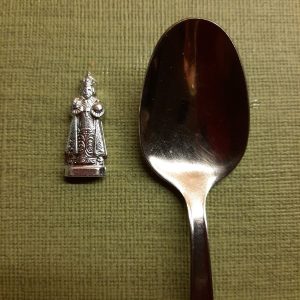 In Ireland, as in some other countries, there is a special devotion to the Child of Prague. Brides seeking a fine day for their wedding traditionally put a statue outside in the open – preferably in the garden- praying that the rain stays away. This works with varying success – a rain free day in Ireland is a big ask and if it happens is a huge gift!
In Ireland, as in some other countries, there is a special devotion to the Child of Prague. Brides seeking a fine day for their wedding traditionally put a statue outside in the open – preferably in the garden- praying that the rain stays away. This works with varying success – a rain free day in Ireland is a big ask and if it happens is a huge gift!
On January 25th here in the Motherhouse in Beechgrove, Drogheda, Ireland we planned a special celebratory event to commemorate the 50th anniversary of the death of our beloved foundress Mother Mary Martin. January in Ireland is winter and can be a month of really challenging weather but it is the variation and changeable nature of Irish weather, especially at this time of year, that proves especially difficult for anyone planning a January event!
I decided to do my bit and play my part in beseeching God for a mild day or at least one without too much rain, snow, sleet, or storms so that guests could travel and the day be honoured. The forecast was looking grim, indeed serious, as the meteorologists, day after day, in the week leading up to the event warned of storms, orange alerts and most of all a red alert – the most serious weather alert possible- for the day before in what has been called ‘Storm Eowyn.’
A friend had travelled to Prague some years ago and decided to bring me back a gift: there it is the tiniest of tiny statues of the Child of Prague. It is sitting beside a teaspoon in the photograph to illustrate its diminutive size. Looking at it I wondered if something so small would “work” but, remembering that ‘small is beautiful’ , I placed it in a shrub outside the door and hoped it would not get lost in the soil or be blown away or indeed forgotten (by me!) I looked at it each time I passed and said a prayer ………..always asking for a mild day.
The bad weather forecast continued – not only was Storm Eowyn forecast but another storm with a Spanish name – Hermina – was coming on its tail. How could this be? So, Friday was to be the apex of Storm Eowyn and Storm Hermina was due to begin on Sunday morning.
I travelled to Drogheda on Thursday as all non-essential travel was banned in Ireland on Friday 24th and we experienced one of the worst and most devastating storms in our recorded history – as I write on Feb 3rd thousands of homes, businesses, and farms still remain cut off from electricity & phone connections and some are still without water too.
Fortunately, the east coast of Ireland did not experience the devastation of those areas on the Atlantic Ocean – all along the western seaboard. Saturday was a beautiful, dry, sunny, mild day in Beechgrove; most guests were able to travel and we had a memorable celebration unmarked by any weather catastrophe. On the following day, returning to Dublin, Storm Hermina was making its presence felt as the wind blew the car along the motorway, trees were shaking, it was raining and the grey sky was ominous.
We were blessed to have had a day of anniversary remembrance between the two storms, to have been able to gather, to travel in safety and not to have experienced the destruction and chaos prevalent in much of the country.
I am thankful to the Child of Prague and I think too that ‘the lady of the day’ – our dear Mother Mary Martin – once again worked her magic or miracle and made sure that we were able to be where we wanted to be. Travelling is so much part of our MMM lives and we all have weathered a few storms too – on that occasion we were certainly living between two of the biggest!
With gratitude for a very happy and safe celebration!
by Nadia Ramoutar MMM Communications Coordinator Ireland 22.02.2025
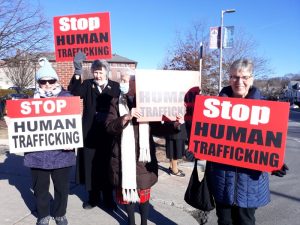 Many years ago before I began my work as a Communications Coordinator for the Medical Missionaries of Mary, I met a young American woman who worked for ten years in India’s red light district helping women get out of prostitution. Then she moved back to the United States and began an organisation called Rethreaded where she taught sex workers how to make clothing and accessories giving them necessary job experience to keep them off the streets. I remember walking up to the door and her opening it. She had an apron on a sweeping brush in her hand. She was sweeping up dead cockroaches.
Many years ago before I began my work as a Communications Coordinator for the Medical Missionaries of Mary, I met a young American woman who worked for ten years in India’s red light district helping women get out of prostitution. Then she moved back to the United States and began an organisation called Rethreaded where she taught sex workers how to make clothing and accessories giving them necessary job experience to keep them off the streets. I remember walking up to the door and her opening it. She had an apron on a sweeping brush in her hand. She was sweeping up dead cockroaches.
“The problem with prostitution,’ she said. “Is that it is largely economic. Women don’t have the money so they get into it to survive and then they don’t have the money to get out of it.”
This year we see that estimated figures for human trafficking of sex workers is expected to increase by 25% and for children it is expected to increase by 30%. Despite the efforts of devoted people, it’s getting worse.
Child trafficking, and other forms of trafficking are rising as poverty, conflict and climate leave more people vulnerable to exploitation, according to the 2024 Global Report on Trafficking in Persons published in January by the United Nations Office on Drugs and Crime (UNODC).
There is a perversity to this that I cannot comprehend but it is a shocking trend that I know we all need to hear. How cruel that people suffering already in poverty will become enslaved in a system that uses people and their bodies for profit. The idea that because a child is poor then they can be sold or taken is appalling but it is not new. The concept of a human being as a commodity to be traded is one that many countries built empires on and many companies made their fortunes upon not just then, but now. How can we put a price on a human life?
It is important that we really take off our rose-coloured glasses and look closes at how human trafficking really works. If we don’t, we will continue to fall rapidly behind in protecting vulnerable people especially children. Our MMM Sisters are actively working to fight this trend and are doing so in some of the poorest communities in the world. Because human traffickers know that this is where they will thrive.
It seems that in a world which can design faster smart phones and use Ai to write books on anything, we are failing as a species in solving this age old problem of trading in souls. Why is it so hard not just to prevent human trafficking but to stop it from thriving and growing so massively in profit?
I wish I had the answer and I am so proud of the MMM Sisters who continue to fight like David against Goliath. We cannot give up in the face of such startling facts.
by Sr. Liana de Jesus MMM USA/Brazil 19.02.2025
 Our life is like a plant, the relationship is very similar. When a plant is a seed, it needs someone to water it until it grows and becomes strong. When a baby is born, he/she needs someone to care for him/her until it grows. As human beings, we are like a plant which needs all loving care. God has given us the freedom to choose what type of plant we want to be in in order to flourish in life.
Our life is like a plant, the relationship is very similar. When a plant is a seed, it needs someone to water it until it grows and becomes strong. When a baby is born, he/she needs someone to care for him/her until it grows. As human beings, we are like a plant which needs all loving care. God has given us the freedom to choose what type of plant we want to be in in order to flourish in life.
Do we want to be like a beautiful flower that needs to be cared for our whole life? Do we want to have someone always giving us water, and food and putting us in the sun’s direction? As human people, we need to develop our deep senses of humility and acceptance that we do need each other and should be the source for others to grow as well. One only can be strong like the trees in the forest because they have other trees, to give support when the wind is strong, otherwise they could easily fall. The tree by itself looks for what it needs to grow strong. When growing between the stones, it looks for the spaces that it needs to survive. For the roots to grow deeper it needs water and for the trunk to grow tall it needs to move in the direction of the sun.
Again, like nature, which takes responsibility for the tree’s growth, we too are responsible for our lives and health to grow and to flourish. It does not matter what type of tree you may become a bamboo tree or a mango tree; even if you have a thunderstorm the tree continues to grow strong as it cared for. In our lives, we may need to develop our connection with nature and become aware that we need to believe that God is in control and will never let us down. Our roots are deep, and we will be able to accept the thunder in our lives and will be ready when the time of death comes.
Every person in life has their process and purpose for being born, the grace to grow old, and to die gracefully. If we were conscious of our connectedness with nature our lives would be fruitful and joyful as we relate with other living beings. Let us care for our nature and life on it.
 Since childhood I have loved dressing up. The excitement of wearing adult clothes, looking like a lady, or parading in a fancy dress costume in our little Christmas plays brought me endless joy and happiness. Best of all was trying on some make-up. Always a favourite of mine! At home I used to sneak into a cupboard in the bathroom and get hold of mammy’s face powder. I was lavish with the powder puff and ended up with some of it all over my face, a goodly supply in my hair making me look grey-haired, and usually with a fine dash on my clothes.
Since childhood I have loved dressing up. The excitement of wearing adult clothes, looking like a lady, or parading in a fancy dress costume in our little Christmas plays brought me endless joy and happiness. Best of all was trying on some make-up. Always a favourite of mine! At home I used to sneak into a cupboard in the bathroom and get hold of mammy’s face powder. I was lavish with the powder puff and ended up with some of it all over my face, a goodly supply in my hair making me look grey-haired, and usually with a fine dash on my clothes. I like going to Mass during the week. The chapel is much quieter, there are fewer distractions and I listen more attentively to the readings and to the homily. At times it feels like I am hearing something for the first time and am surprised that I had missed it before.
I like going to Mass during the week. The chapel is much quieter, there are fewer distractions and I listen more attentively to the readings and to the homily. At times it feels like I am hearing something for the first time and am surprised that I had missed it before.by Sr. Chinyereugo J. Iwunze Nigeria/ Ireland 08.02.2025
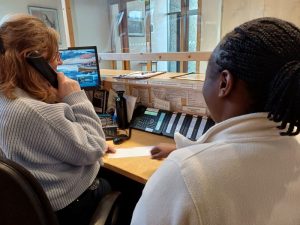 The Reception and telephone switchboard provides an essential front-line service in a complex facility like the MMM Motherhouse in Drogheda. It is a place of contacts and encounters and monitors all the movements in the Community. It requires physical and psychological alertness to be there.
The Reception and telephone switchboard provides an essential front-line service in a complex facility like the MMM Motherhouse in Drogheda. It is a place of contacts and encounters and monitors all the movements in the Community. It requires physical and psychological alertness to be there.
My first day in this department was on the 11th of June, 2024. That warm afternoon, the staff on duty with the sister in-charge gave me a warm welcome, and I was asked to come for 30 minutes daily in the afternoon for my induction. That faithful day of inception was like the experience of the men sent by Moses to spy the promised land in Deuteronomy1:28. They said ’’ …they saw the men, they are like giants…’’
When I saw the four switchboards glued together with up to 80 to 100 extension numbers to the rooms and offices in the house with their extension numbers and the Tannoy for paging and announcement. I was overwhelmed, because the use of a land line as a means of communication would not be a common way of communication at home in Nigeria. In the few places I encountered them at home I dreaded them and never had anything to do with them. So, working in that department was like confronting a giant I dreaded.
Thanks to our two lovely receptionists – Miriam Killeen and Winnie Mullen – who tutored and mentored me. My sister in-charge of the department, Sr. Eilis Weber and the sisters who work in that department were wonderful instruments at my beginning, belonging and becoming part of the telephonist/receptionist team.
At times the phone rings once in 30 minutes and sometimes couple of times within 5 minutes. Each one is a unique interaction. A caller might like to speak with a Sister in the office or in her room. This would need to be transferred to the appropriate domain. If the Sister or the staff needed is not available to answer the phone, the person is paged to get his or her attention. At times, it could be a call that requires quick thinking and discretion. In all, politeness and listening carefully are needed. Some sisters are on call at specific hours to seek advice when need be.
The morning rush begins as employees start to filter in. My attention shifts between the phone and the reception service. I greet each person with a warm smile, whether it’s a familiar face or a first-time visitor. The post man comes with the delivery which is stamped and smoothly distributed to each sister’s square box or to the different offices. The daily crosswords are photocopied from the newspaper as they are delivered, and the concerned communities and library receive their copies. Another occurrence is an internal or external call of a Sister looking for a Sister’s mobile number, an address or other contacts. Multitasking becomes second nature as I juggle calls, visitors, and other administrative tasks.
As Sisters sign out for a walk to go downtown or to the garden. I discretely monitor their walking gait and keep tract of the duration of time away. Depending on the fragility, after waiting without seeing the person, I call the person’s room number in case she entered through another door.
The early evening sees a rush activity as the staff round up the day’s work. I let them out through the door as I bid them goodbye. Within this period, people for different prayer request call and their intentions are typed and put up at the board beside the oratory.
Being on duty after supper duty can be quiet, more than any other shift in terms of reception work. I ensure that there are proper lock ups. At 8.40pm, the phone automatically switches over to the night duty mobile phone. The challenges, the problem-solving, and the constant interactions are what make the services dynamic and rewarding. That gave me a sense of accomplishment that I encountered people, they made me happy, and I made them happy too.
To all the angels I encountered, may God bless you in good measure!
by Sr. Margaret Anne Meyer MMM USA 05.02.2025
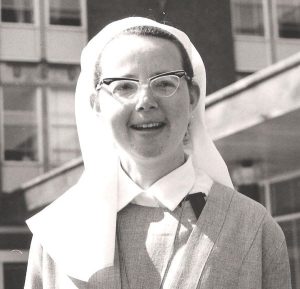 There I was – in front of the door where six months previously I was wrapped in my father’s arms before he left to board the plane for JFK in New York. I could still feel the love and warmth of our embrace but now he had suddenly died, and the pain of loss and grief was creeping in. In those days, May 1966, the flight left Dublin at 2 PM and stayed in Shannon for an hour to let passengers have time to browse the duty-free shops. I stayed on the plane, remembering the good times I had spent with my father. I do not remember being checked there for entrance into the USA. The flight landed in New York around 6pm. Three large books contained all the passport numbers, and I was very relieved when my number was found, and I was let into the USA.
There I was – in front of the door where six months previously I was wrapped in my father’s arms before he left to board the plane for JFK in New York. I could still feel the love and warmth of our embrace but now he had suddenly died, and the pain of loss and grief was creeping in. In those days, May 1966, the flight left Dublin at 2 PM and stayed in Shannon for an hour to let passengers have time to browse the duty-free shops. I stayed on the plane, remembering the good times I had spent with my father. I do not remember being checked there for entrance into the USA. The flight landed in New York around 6pm. Three large books contained all the passport numbers, and I was very relieved when my number was found, and I was let into the USA.
It was difficult meeting with my mother and family. We were all in great sorrow, but I was incredibly grateful to be able to be there. It was the first time to be home in eight years.
My father got his wish not to be waked for two nights as was the custom in those days. The funeral parlor was full, so I was in time for the wake. So many people came to pay their respects. My brother Albert’s class from Christ the King High School were among them. The next morning, we gathered at the funeral parlor again. I remember praying in front of the coffin. I could not cry then because I was so thankful that my father and I had grown closer together. He really was now happy that I had entered MMM. He told me before I entered that if he had had a better salary I would choose differently. It was a suffering on both of us and now, as he had told others, he was with his son-in-law, Jesus.
The funeral Mass was celebrated in our Parish Church, St. Theresa of Avila, in Queens, New York. It was the first time that I attended a Mass where the priest faced the people. He was buried in the Meyer family plot, originally belonging to his grandfather, August Meyer, who came from Germany in the 1860’s.
I was grateful to be with my mother for about ten days. During that time, I took a shuttle flight to Boston from JFK for $28 return. I wanted to visit the Sisters in Winchester. We were excited to see each other. I was asked to say a few words to the novices and there seemed to be many at the long table in the Community Room. All were exceedingly kind to me and prayed for my Father, Albert Meyer.
Soon it was time to return to Ireland. It was harder to leave my mother than when I first entered 10 years previously. God gives the grace. It was near the time to leave for Uganda but that is another story.
by Nadia Ramoutar MMM Communications Coordinator Ireland 01.02.2025
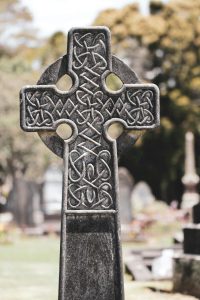 A few years ago, Ireland adopted St Brigid’s day as an official holiday taking place on the first Monday in February. There are a lot of legends and myths around Brigid, but if we study her life we can see she was a woman well ahead of her time.
A few years ago, Ireland adopted St Brigid’s day as an official holiday taking place on the first Monday in February. There are a lot of legends and myths around Brigid, but if we study her life we can see she was a woman well ahead of her time.
As we look at her significance, we find there are some ways in which she is a wonderful role model. Here are some lessons we can learn from her.
1. You can bring light. St Brigid was luminous. She was born around 452, near Dundalk which is close to where our MMM Convent in Drogheda. The winters then must have been very dark and cold, but many stories tell of St Brigid bringing light and healing to other people.
2. Be careful of the company you keep. During her life, Brigid became close friends with St Patrick, the patron Saint of Ireland. She grew closer to him as she aged. No doubt these two ordinary people who became “Saints” in later life inspired one another.
3. There is power in collaboration. It may have been a man’s world when St Brigid was alive, but she got things done. Around 470, Brigid founded a “double monastery” (one for men and one for women), over which she ruled as abbess. She appointed St Conleth as bishop, and between them they governed the church together.
4. There is power in kindness. Whatever about the many stories surrounding her name, Brigid emerges as a strong and gentle woman, a powerful leader, a skilful healer and wise spiritual guide. She has become for many a potent symbol of Christian womanhood, showing us the feminine face of God.
5. Don’t let people limit you. What makes her particularly relevant for us today is the range of issues she embraced and the manner in which she dealt with them. She was a peacemaker who intervened in disputes and brought about healing and reconciliation.
6. Be generous. One story tells of her giving away her father’s precious sword to a poor man so that he could barter for food to feed his family. She practised hospitality and had a special concern for the poor and marginalised.
7. Pray and take action. She was no stranger to hard work and there are stories of her milking cows, shepherding her sheep, helping with the harvest and even brewing the ale! But she was also a woman of contemplation, given to long hours of prayerful reflection.
8. Be in tune with nature. Brigid was wonderfully attuned to the seasons and nature. It is no accident that today many individuals and groups concerned about the environment and our treatment of the planet, draw inspiration from her.
9. It may take a while for your efforts to be appreciated considering that St Brigid died in 525 and her day was made a holiday in 2024!
10. Don’t be afraid to ask for what you want and for what other people need. She was generous but also believed in justice. She was willing to fight for those who were vulnerable.
I hope we will contemplate how we can be braver, more giving, kind and compassionate in the year ahead. Thank you, St Brigid, for showing us the way.
by Sr. Sekunda Kimario MMM Tanzania 29.01.2025
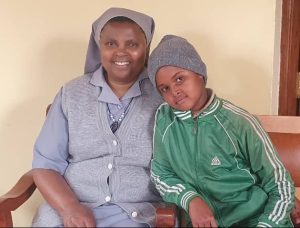 I answered the doorbell this morning, and found a 9-year-old girl wearing a tracksuit and a woollen cap. She introduced herself as Dorothy and said that she came to ask me to teach her how to pray so as to become a Medical Missionary of Mary. Dorothy comes from our Parish and was touched by an MMM celebration that was held there last Sunday.
I answered the doorbell this morning, and found a 9-year-old girl wearing a tracksuit and a woollen cap. She introduced herself as Dorothy and said that she came to ask me to teach her how to pray so as to become a Medical Missionary of Mary. Dorothy comes from our Parish and was touched by an MMM celebration that was held there last Sunday.
Dorothy is in Standard 5 of her primary education, so she has a long way to go. But I have found in my experience that some young girls feel ‘the fire in the belly’, and they are dying to be listened to by someone who would understand. When the seed of a vocation is sown at a young age, the girl concerned is more determined and perseveres more resolutely. St Benedict talks about the ‘School of the Lord’s Service’, and how we should ‘See and Seek God in all things. Dorothy may not yet have heard of St Benedict, and how basic his spirituality is to us MMM’s, but she feels the call exactly as he describes it. Of course, Dorothy is too young to make this decision. It is something she will need to think and pray about as she grows into adulthood. We take this kind of decision as adult women.
We pray that Dorothy may not lose her determination and that she will one day take her vows and live a full life as an MMM.
by Sr. Sheila Campbell MMM Ireland 25.01.2025
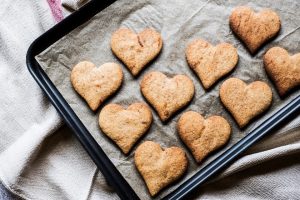 The other day I came across this image and for some reason it tugged at my heart! I am not a baker, but I do recognise the skill. More importantly, I recognise the love and dedication it takes to pick out all the ingredients, measure, mix and shape the biscuits. Are they the perfect shape? No, but it doesn’t matter, it is the love that is poured into the mix with the ingredients.
The other day I came across this image and for some reason it tugged at my heart! I am not a baker, but I do recognise the skill. More importantly, I recognise the love and dedication it takes to pick out all the ingredients, measure, mix and shape the biscuits. Are they the perfect shape? No, but it doesn’t matter, it is the love that is poured into the mix with the ingredients.
I feel the same love that God pour into my life by giving me close friends. Are they perfect, of course not but they know me in all my imperfections and love me despite them. “Perfect Love casts out fear”, St. John tells us. I think our deepest fear is that of being rejected. When we are accepted by a friend, we see the reflection of the love God has for us. What is my response? Hopefully to respond with love in return, but we are complicated human creatures and we often mis-read the signals. I want to reach out, but I may end up seeming “suffocating” – we all need our personal space, physically but also psychologically. That is why mixing, measuring and taking care is so important.
Yes, I will get it wrong some days and have to apologise or make it up with some kind gesture, but I will work at the relationship because it matters to me, and it matters to God. Few of us will ever have a direct divine revelation of God’s love. For most of us, it is mediated by the love other people give us and we give in return.
I remember my mother used to bake an apple tart when my older brother came home to visit. I used to tease her that he was the favourite. I don’t really think he was – she did spread the love around generally but “home baking” was her visible sign that the person was loved, welcomed and would be fed. Isn’t that basically the message we want to give all our friends, thanking God for the ability to do so.
